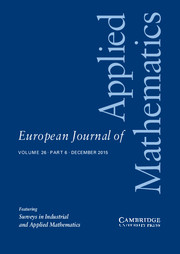Crossref Citations
This article has been cited by the following publications. This list is generated based on data provided by
Crossref.
Li, Zhipeng
and
Zhang, Run
2013.
An Extended Non-Lane-Based Optimal Velocity Model with Dynamic Collaboration.
Mathematical Problems in Engineering,
Vol. 2013,
Issue. ,
p.
1.
Liu, Shu Hua
and
Liu, Yu Qing
2014.
Emergency Distribution Optimization Based on Improved DEA Model.
Applied Mechanics and Materials,
Vol. 687-691,
Issue. ,
p.
5097.
Göttlich, Simone
Kolb, Oliver
and
Kühn, Sebastian
2014.
Optimization for a special class of traffic flow models: Combinatorial and continuous approaches.
Networks & Heterogeneous Media,
Vol. 9,
Issue. 2,
p.
315.
C. Cascaval, Radu
D'Apice, Ciro
Pia D'Arienzo, Maria
and
Manzo, Rosanna
2017.
Flow optimization in vascular networks.
Mathematical Biosciences and Engineering,
Vol. 14,
Issue. 3,
p.
607.
Cascaval, Radu C.
D’Apice, Ciro
and
D’Arienzo, Maria Pia
2017.
Simulation of heart rate variability model in a network.
Vol. 1863,
Issue. ,
p.
560054.
D’Apice, Ciro
and
Kogut, Peter I.
2017.
On optimal control problem for conservation law modelling one class of highly re-entrant production systems.
Vol. 1863,
Issue. ,
p.
560055.
Majumder, Saibal
and
Kar, Samarjit
2018.
Multi-criteria shortest path for rough graph.
Journal of Ambient Intelligence and Humanized Computing,
Vol. 9,
Issue. 6,
p.
1835.
de Falco, Massimo
Mastrandrea, Nicola
Mansoor, Wathiq
and
Rarità, Luigi
2018.
New Trends in Emerging Complex Real Life Problems.
Vol. 1,
Issue. ,
p.
209.
Alba-Pérez, Joel
and
Macías-Díaz, Jorge E.
2019.
Analysis of Structure-Preserving Discrete Models for Predator-Prey Systems with Anomalous Diffusion.
Mathematics,
Vol. 7,
Issue. 12,
p.
1172.
Rarità, Luigi
2019.
Advances in Optimization and Decision Science for Society, Services and Enterprises.
Vol. 3,
Issue. ,
p.
303.
Abbas, Muhammad Tahir
Muhammad, Afaq
and
Song, Wang-Cheol
2020.
SD-IoV: SDN enabled routing for internet of vehicles in road-aware approach.
Journal of Ambient Intelligence and Humanized Computing,
Vol. 11,
Issue. 3,
p.
1265.
D'Arienzo, Maria Pia
and
Rarità, Luigi
2020.
Growth effects on the network dynamics with applications to the cardiovascular system.
Vol. 2293,
Issue. ,
p.
420041.
D'Arienzo, Maria Pia
and
Rarità, Luigi
2020.
Management of supply chains for the wine production.
Vol. 2293,
Issue. ,
p.
420042.
Yang, Lu
and
Wang, Lizhen
2020.
Mining traffic congestion propagation patterns based on spatio-temporal co-location patterns.
Evolutionary Intelligence,
Vol. 13,
Issue. 2,
p.
221.
Hu, Shufang
Qiu, Wenlin
and
Chen, Hongbin
2020.
A backward Euler difference scheme for the integro-differential equations with the multi-term kernels.
International Journal of Computer Mathematics,
Vol. 97,
Issue. 6,
p.
1254.
Jiwari, Ram
Kumar, Vikas
and
Singh, Sukhveer
2022.
Lie group analysis, exact solutions and conservation laws to compressible isentropic Navier–Stokes equation.
Engineering with Computers,
Vol. 38,
Issue. 3,
p.
2027.
Bayen, Alexandre
Monache, Maria Laura Delle
Garavello, Mauro
Goatin, Paola
and
Piccoli, Benedetto
2022.
Control Problems for Conservation Laws with Traffic Applications.
Vol. 99,
Issue. ,
p.
39.
Sun, Wenjuan
Bocchini, Paolo
and
Davison, Brian D.
2022.
Objective Resilience.
p.
127.
D’Arienzo, Maria Pia
Durazzo, Gerardo
and
Rarità, Luigi
2024.
A possible design of paths on urban networks in critical conditions.
Vol. 3158,
Issue. ,
p.
500058.
D’Arienzo, Maria Pia
and
Rarità, Luigi
2024.
Dynamics of Blood Flows in the Cardiocirculatory System.
Computation,
Vol. 12,
Issue. 10,
p.
194.


